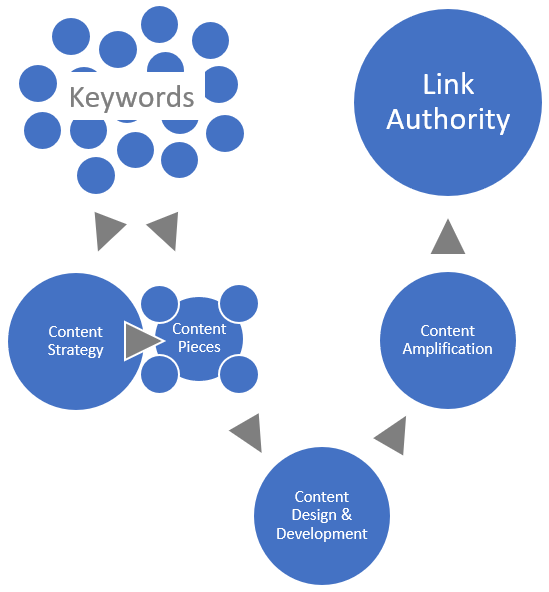Keywords have the power to change your natural search performance, but not in the way you think. The importance of keyword data goes beyond title tags and headings on a page. Think of keywords as a hoard of opportunities to increase your link authority via content creation and promotion.

Identifying keywords that prospects most search for will dictate content, which, if engaging, will prompt others to link it, increasing your site’s authority.
Link authority is one of the most critical influencers of how a site ranks. It is the aggregation of all of the links it receives from others. Each of those other sites has some amount of link authority. When they link to your site, it’s a vote of confidence that indicates that your site has some value or authority worthy of linking to on a particular topic.
Search engines then use that topical vote of confidence to determine how your authority — or worthiness to rank — compares to other sites each query.
So how do keywords increase link authority? They indicate the content you need to create to convince other site owners to that your site is worthy of linking to, which in turn conveys worthiness to rank.
Keyword Data
It all starts with the data. Keyword data helps you understand your customers and prospects — what they want and need. When they enter a query into the search bar, they’re expressing a desire to learn something or buy something.
You can use that information in aggregate to inform overall content strategy as well as individual pieces.
I’ve addressed the mechanics of keyword research and analysis, at “SEO How-to, Part 5: Keyword Research in Action.”
Content Strategy
With keyword data firmly in hand, you can better understand the types of information searchers want and their intent behind that desire.
In addition, you’ll know which desires drive the most search demand. The more people searching for a topic, the more valuable it becomes for you to target in your content.
For instance, say you sell gift baskets. Keyword data would tell you if people want fruit baskets and wine baskets in greater numbers than chocolate baskets. It could also tell you the popular gift recipients (such as men and business gifts) and popular gift-giving occasions (such as Christmas and birthdays).
Based on that information, combined with current organic search data and your knowledge of which products are most profitable, you can assemble a content strategy and roadmap.
For more on using keyword data to inform your content strategy, see “SEO: Driving Content Strategy with Keyword Research.”
Individual Pieces
Next, with the strategy in place, develop an editorial calendar of individual content pieces.
“Content” in this context means anything you put on a web page that fulfills the consumer’s desire and intent. That could be a quiz, a buying guide, a how-to guide, a video, an illustration, or a long-form article.
It is not referring to pages crammed with keywords solely to attract search engines. If your content doesn’t engage consumers, they won’t share and link to it. That defeats the search engine optimization goal of creating the content in the first place.
Collaboration
But it’s not enough to do the research and hand ideas over to the designers and developers to implement. Creative collaboration is key to ensuring that the content will drive natural search value when it goes live.
There are guidelines for content, regardless of the form, that drives the most value for SEO.
- Include textual content. If your content is in a form that search engines have trouble indexing, such as a quiz, video, or image, include a textual headline and summary on the page as well. This will to convey contextual relevance to the search engines, to match your content with relevant searches.
- One page, one piece of content. Some content — such as videos and FAQs — tend to be aggregated on a single page. That makes it difficult to convey the specific relevance of any one piece. If each video, for example, contains unique information, something that consumers would search for, place it on a separate page for that specific keyword theme.
- Host on your ecommerce domain. The point is to encourage people to link back to your site. If you use another domain for the content you’re creating, the links will accrue to it, not to the domain you want to increase link authority for.
- Don’t use syndicated content. Unique content is key to success. Don’t syndicate content from other sites. Syndicated content typically contains canonicals referring the link authority to the originating sites, not yours.
Spread the Word
Your content won’t earn a drop more link authority if no one sees it or links to it.
Promote the content via public relations, social posts, email, and other channels.
For instance, social media managers can share a video or image. But engaging people on Facebook doesn’t result in links back to your own website. Sharing something on Facebook that produces a click to your site can result in shares and links for that content. And while Facebook shares don’t directly impact search rankings, they widen the distribution of that content to others who could link.
Public relations can also influence links back to the site. Part of getting links is asking for them. Some media sites don’t link directly to the entities they report on. But others do. Coach your PR team on how to ask for that link, and what to link to. And make sure your content is worth linking to — not just a press release.
For more, see “SEO: 6 Ways to Increase Backlinks.”